Tuk Tuk Tours
Explore Bangkok by the iconic tuk tuk
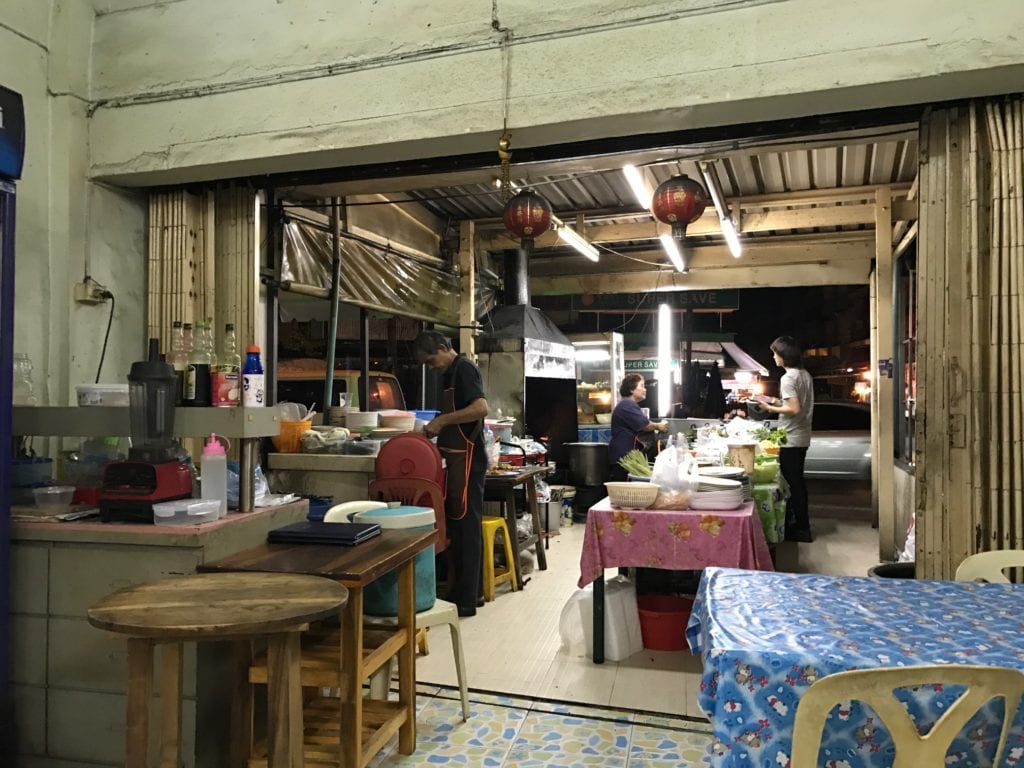
Yet for those visiting, the Thai food scene in the vast metropolis that is the capital city of Bangkok looks unbelievably different today compared to even just a few short years ago. It often seems like Thailand’s authorities work on a constant cycle for setting out to sanitise the street food scene for which the Thai capital is known and loved worldwide, and life under the military regime in power since 2014’s coup has seen more than its usual share of attempts to supposedly ‘return the pavements to the people’ and clear out those elements evidently seen as undesirable.
So it was that the latest round of dramatic headlines announced that street food would apparently be cleared from the streets of Bangkok, ricocheting across the globe as media outlets and individual foodies worldwide worried that they might have already had their last fix of delicious, authentic Thai street food – something which anyone who has ever tried it knows you simply can’t ever get enough of. Well, in spite of what certain self-appointed experts may claim online, let’s place this on the record right from the pavements of Bangkok: the street food is still here. You can rest easy, for now at least.
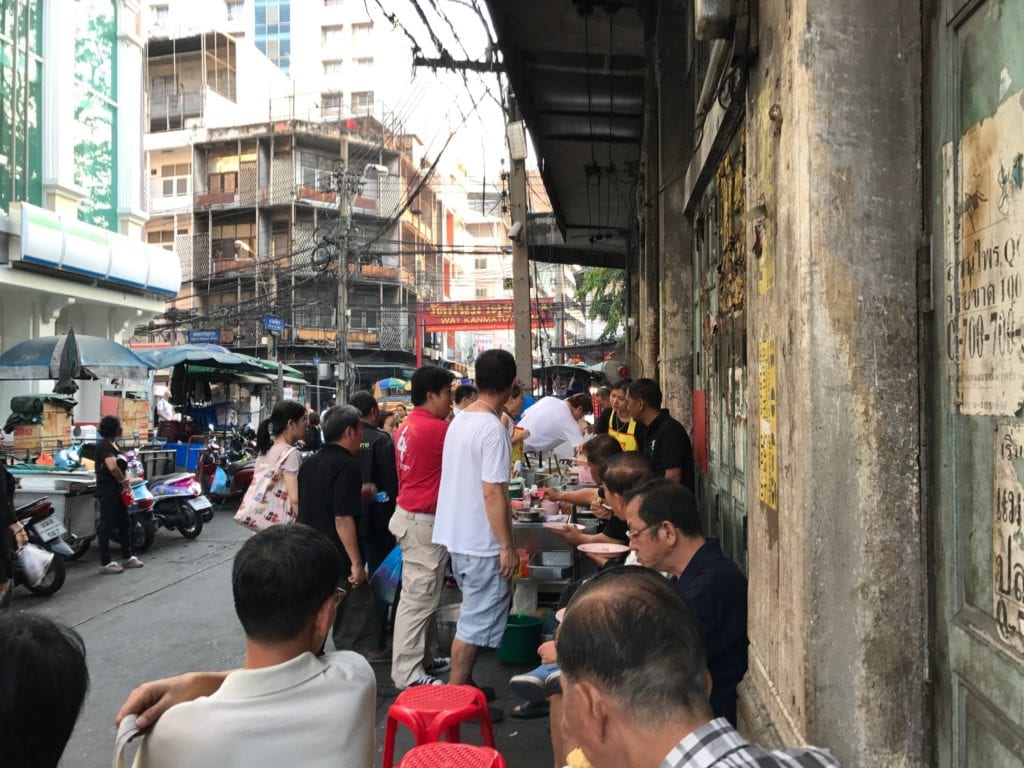
It’s true that in certain parts of the capital, street food stalls operating on public footpaths have been pushed back away from the main roads and onto quieter side alleys. That’s bad news for both the vendors who rely on the greater footfall of main roads in order to earn a decent living, and for those of who find that one of the best things about Thai street food in Bangkok is its sheer ubiquitousness, the fact that it really is (or at least historically has been) on hand at every street corner.
On the other hand, that’s balanced against the very real and loud calls for Bangkok’s pavements to become more pedestrian-friendly – something that at the moment, across the vast majority of the capital, they are anything but. Critics (and I am one of them) still downplay the inconvenience that is genuinely caused by the majority of street food vendors across Bangkok. (There are certainly more extreme instances of pedestrian access being blocked just about altogether, but there are far more cases where stalls pose much less of a hindrance, and actually co-exist with foot traffic quite well.)
Such critics insist both that any inconvenience is a small price to pay for the rich, vibrant culture of Bangkok street food, and that street vendors are far from the worst offenders when it comes to making the pavements a no-go zone (motorbikes riding on the pavements, and phone boxes/steps up to footbridges bafflingly placed right in the middle of the footpath, we’re looking at you both). Nevertheless, it’s difficult to dispute that street food vendors do play their part in the difficulties, and that something almost certainly has to change if everyday outdoor Bangkok is ever to improve its shockingly and embarrassingly low level of accessibility to, say, wheelchair users.
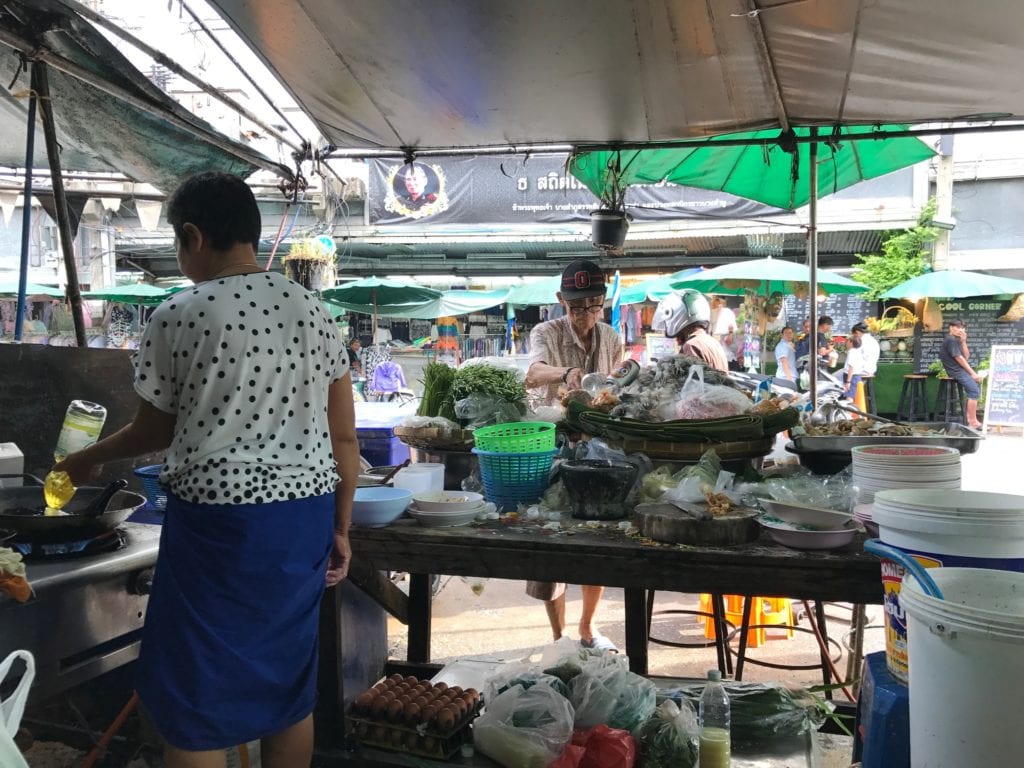
That’s all without mentioning the fact that street food is, far beyond its deservingly beloved status among both overseas visitors and affluent Thai and foreign residents, first and foremost a livelihood for the vendors and pretty much a life-or-death matter for the millions of working-class local residents who rely on street stalls to provide access to low-cost, filling dishes that they can afford on minimum wage or thereabouts.
Many of the instances of street food being pushed off main streets have occurred in typically busy and congested downtown areas, which so happen to be areas popular with and most often frequented by foreign tourists as well as residents living in expatriate-heavy neighbourhoods. This goes some way to explain the on-balance-misplaced alarm expressed by some such tourists and residents online, insisting that ‘there’s no street food left in Bangkok’ and displaying distrust of those of us who claim otherwise. Take a wander around a local Bangkok neighbourhood that’s even ever so slightly more in the sticks, though, and you’ll find that the street food game there is still pretty much business as normal. (If you want to do this, countless such areas are still within easy reach of the Skytrain and subway, and in any case they were always among some of the best places to head for truly great street food.)
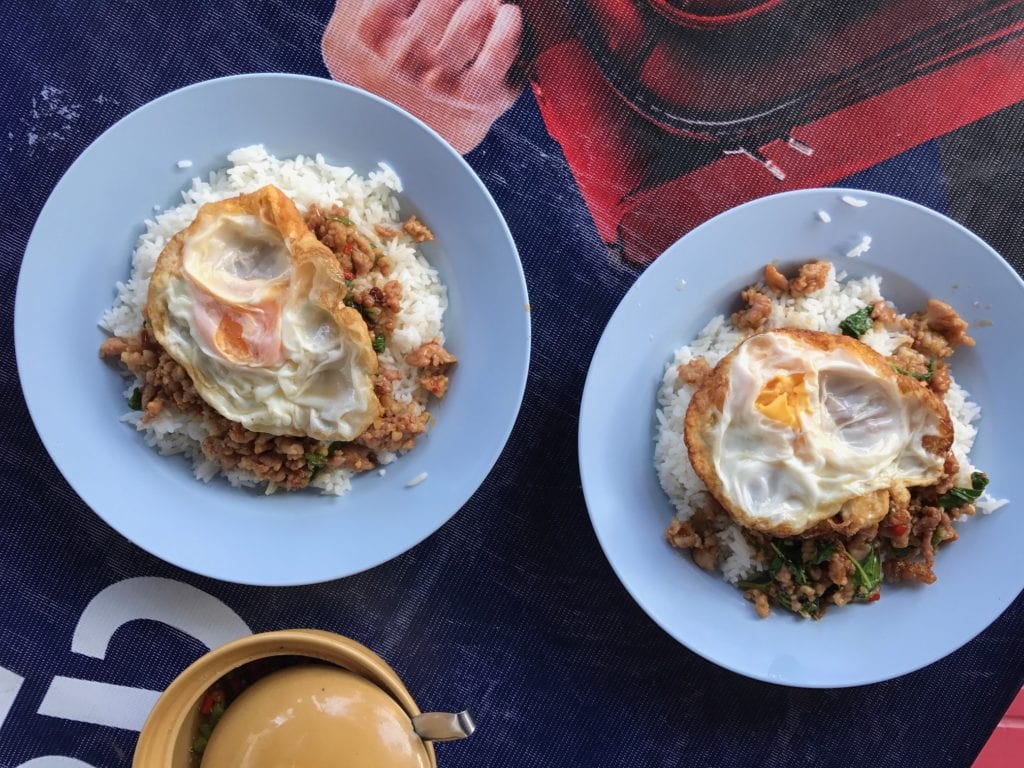
We would also have our heads in the sand if we didn’t acknowledge that there has indeed long since been a campaign to ‘cleanse’ Bangkok of its street food culture, disliked and looked down upon by some elite sections of society, and instead move towards the kind of arrangements instituted in nearby Singapore, where stalls have long since been moved off the streets themselves and into rented spaces in communal food courts or ‘hawker centres’ dotted around the city. Indeed fans of Bangkok’s historic street food culture frequently bemoan city and national authorities’ efforts to reorganise and restrict the activities of street food vendors as part of a move towards a supposedly ‘sanitised’ Singapore-style model in the city.
That is arguably echoed in the huge rise in the number of shopping centres and condominiums that have been thrown up across Bangkok in recent years, in many cases with street food stalls, local restaurants and other such venues, and other markers of local community life being stripped out to make way for the new developments. The result, street food lovers (including this one) and critics of the Thai capital’s movement in that direction will tell you, is far more soulless neighbourhoods devoid of street food options – where your only real options for eating are inside mammoth-sized shopping centres owned by equally enormous corporations – that leave significant parts of the population priced out of their own areas. That is indeed already the case to some extent in some of the most downtown neighbourhoods of Bangkok, where many argue the traditional street life culture so beloved among both locals and visitors has already been lost.
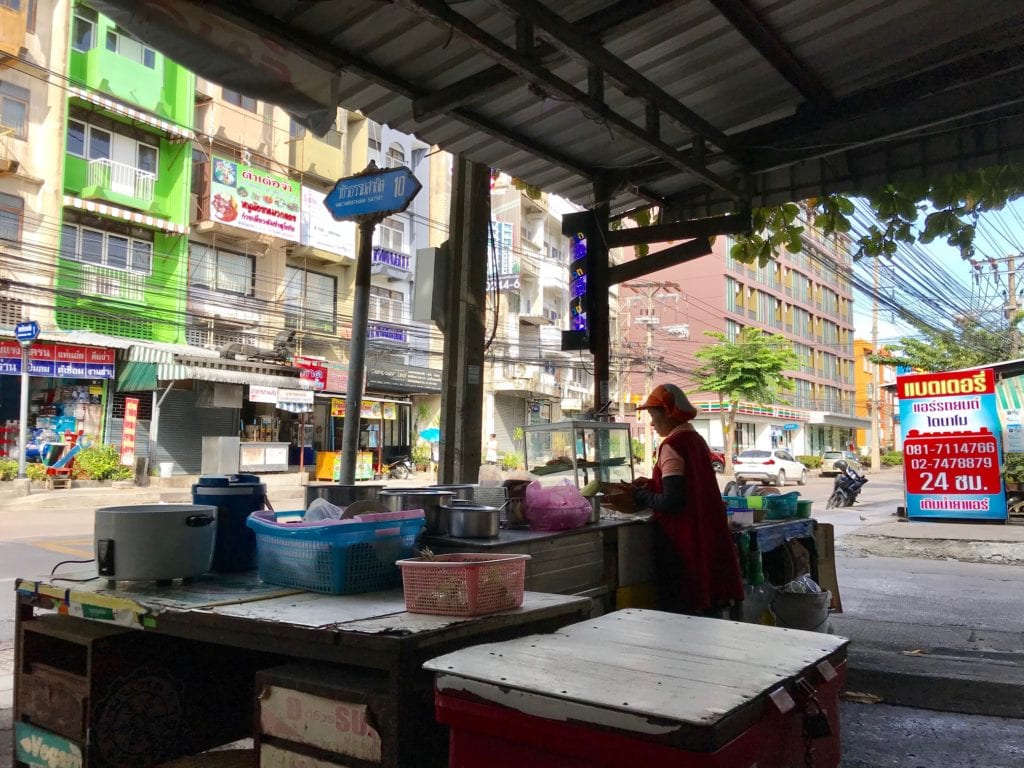
Such developments have far from reached their natural conclusion, too – indeed, they still continue with unrelenting force. So the earlier message that ‘the street food is still here’ comes with one enormous caveat: it is still under threat, and it may not be here forever.
In the aftermath of the global rash of bad PR for the Thai tourist industry following authorities’ reported pronouncement of their intention to ‘ban’ street food from the streets of Bangkok altogether, their apparent backtracking subsequently generated headlines worldwide as people breathed a sigh of relief at their beloved street food being granted a reprieve.
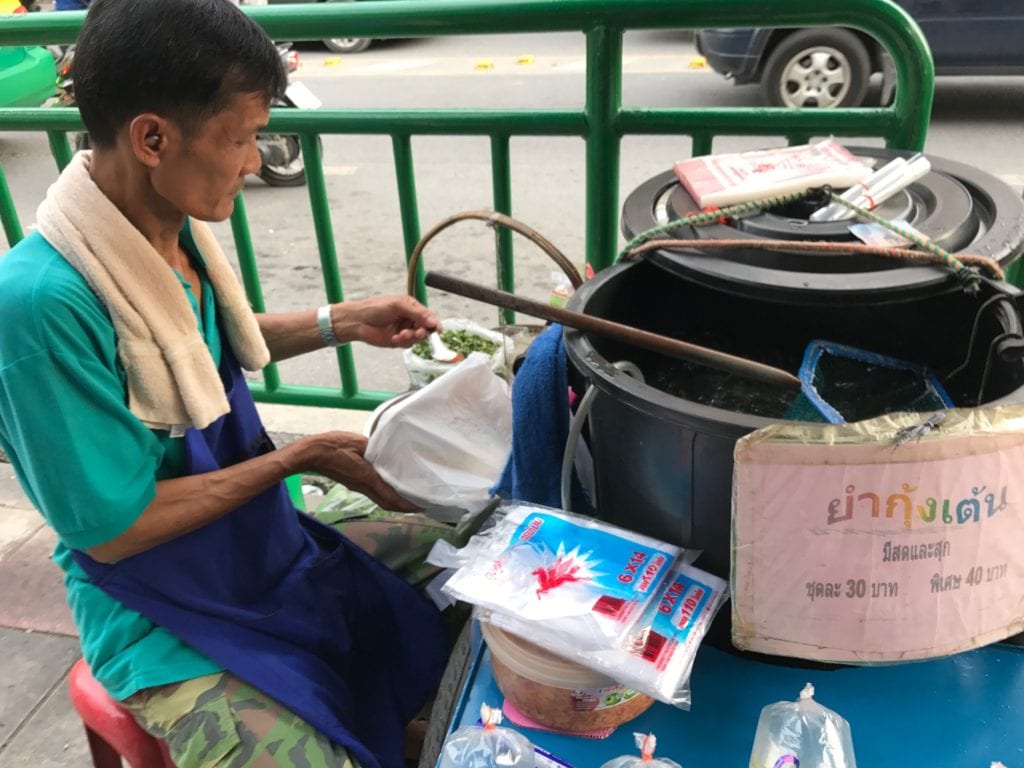
Much less well publicised was the fine print to that supposed reprieve, namely that the Thai authorities would indeed continue their fight to ‘reorganise’ street food stalls in specific areas, most notably the forever bustling and street-food-heavy Chinatown neighbourhood of Yaowarat, and backpacker enclave of Khaosan Road. That has already played out to some extent, and will doubtless continue further. Those of us who dearly love Thai street food in Bangkok – and even more so those residents who genuinely depend on it – should be under no illusion that the spectre of that threat of ‘reorganisation’ will remain, and it will in all likelihood extend its reach to other areas (and more of them) that have so far been spared the worst of its wrath.
For now, almost all of Bangkok’s renowned street food is still safe, but the message is clear: it’s still under constant and immense threat. If you value it, feast on it while you still can.
All views expressed are the author’s. All photos by Chris Wotton.
At Expique our mission is to help people discover the real Bangkok and the local cultures. We do this through a range of experiences including Food Tours, Walking Tours and Tuk Tuk Tours
If you love food as much as us,
you will love our food tours in Bangkok
Subscribe to Our Newsletter
Subscribe to our newsletter to receive monthly news and tips about exploring Bangkok.
Comments are closed.
Street food vendors in Bangkok make Bangkok unique livelier brighter saver and known for the the tourist to try and to get to know more about Thai foods ….different than other countries like Singapore or Vietnam ……
Just too bad that we lost all that feeling now the streets are empty and dark at night frankly said It’s kind of scary ……
If you said U want to return the pavement to people , they are the one that eat and shop on the street ….. the rich one don’t care because they don’t walk around there eat and shop .
Let’s those vendors back on the street and support them please ……they’ve been doing for generation after generation just to make view little money , where are they now ? Cast aside faraway somewhere or went back to the village because they can’t make money and afford living in the city anymore because people complained they took the street pavement and want the street looks clean ?
Think about it !
While the article above presents both sides of the story. We personally are in favour of street vendors as they are a vital part of the local society, economy and culture.